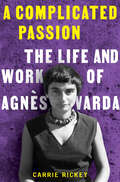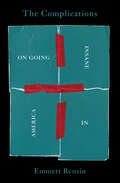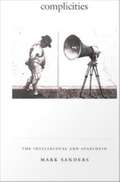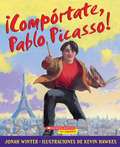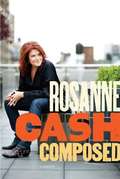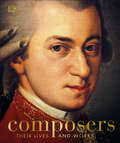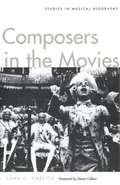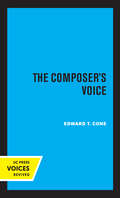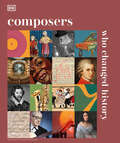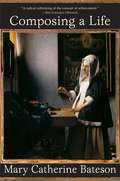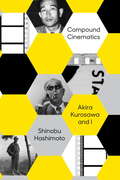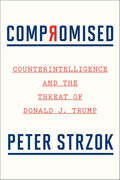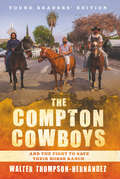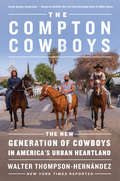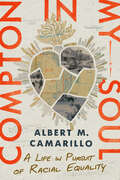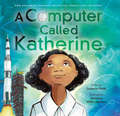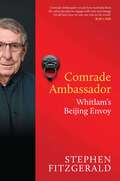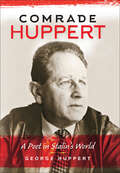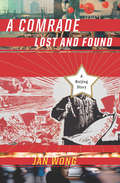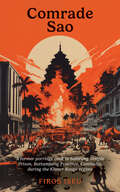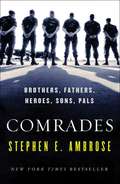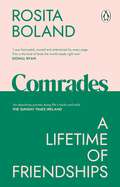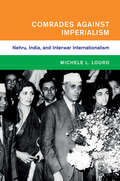- Table View
- List View
A Complicated Passion: The Life and Work of Agnès Varda
by Carrie RickeyThe first major biography of the French filmmaker hailed by Martin Scorsese as “one of the Gods of cinema.” Over the course of her sixty-five-year career, the longest of any female filmmaker, Agnès Varda (1928–2019) wrote and directed some of the most acclaimed films of her era, from her tour de force Cléo from 5 to 7 (1962), a classic of modernist cinema, to the beloved documentary The Gleaners and I (2000) four decades later. She helped to define the French New Wave, inspired an entire generation of filmmakers, and was recognized with major awards at the Cannes, Berlin, and Venice Film Festivals, as well as an honorary Oscar at the Academy Awards. In this lively biography, former Philadelphia Inquirer film critic Carrie Rickey explores the “complicated passions” that informed Varda’s charmed life and indelible work. Rickey traces Varda’s three remarkable careers—as still photographer, as filmmaker, and as installation artist. She explains how Varda was a pioneer in blurring the lines between documentary and fiction, using the latest digital technology and carving a path for women in the movie industry. She demonstrates how Varda was years ahead of her time in addressing sexism, abortion, labor exploitation, immigrant rights, and race relations with candor and incisiveness. She makes clear Varda’s impact on contemporary figures like Ava DuVernay, Greta Gerwig, Barry Jenkins, the Safdie brothers, and Martin Scorsese, who called her one of the Gods of cinema. And she delves into Varda’s incredibly rich social life with figures such as Harrison Ford, Jean-Luc Godard, Jim Morrison, Susan Sontag, and Andy Warhol, and her nearly forty-year marriage to the celebrated director Jacques Demy. A Complicated Passion is the vibrant biography that Varda, regarded by many as the greatest female filmmaker of all time, has long deserved.
Complications: A Surgeon's Notes on an Imperfect Science
by Atul GawandeA surgeon writes about some of his most interesting patients.
The Complications: On Going Insane in America
by Emmett RensinAn unflinching, rare account of living with severe mental illness that is also a bold commentary on how we misunderstand this often debilitating disease.The Complications is an intimate portrait of what it’s like to live with schizoaffective disorder of the bipolar type as well as a biting, revelatory critique of America’s mental health culture. Emmett Rensin has written and edited articles for major national media outlets, and taught writing and literature at prestigious schools. But he has also lost jobs and friends, been hospitalized and institutionalized, and cycled through a daunting combination of medications. With scorching honesty, he reflects on his messy, fragile attempt to live his life, his periods of grace, and his near misses with disaster and death.Going beyond the usual peans against “stigma” and for “understanding”, Rensin confronts the dysfunction in current mental health narratives, contrasting what he calls mental illness “high culture”—in which we affirm the prevalence of anxiety and encourage regular therapy, insisting that the “mentally ill” aren’t dangerous or even weird—with even progressive society’s inability to contend with people with more severe forms of mental illness: those people we pass on the street talking to themselves, those caught in a loop between hospitals and prisons, or even those who we cannot tolerate in our own schools, offices, and lives, including himself. With raw honesty, Rensin invites us into every aspect of his life, from what it’s like see four different psychiatrists in one year and the nature of psychotic breaks to a harrowing diary that logs exactly what happens when he stops taking his medication and the unexpected kinship he discovers with an incarcerated spree killer with schizophrenia. Going beyond pure memoir, he reflects on the uncertain “science” of diagnosis, the nature of art about and by the insane, political activism, and the history of madness, from the asylum to the academy. A compelling, often devastating, blend of memoir, cultural commentary, and history, The Complications elevates the conversation around mental illness and challenges us to reexamine what we think we know about what is to go insane.
Complicities: The Intellectual and Apartheid
by Mark SandersComplicities explores the complicated--even contradictory--position of the intellectual who takes a stand against political policies and ideologies. Mark Sanders argues that intellectuals cannot avoid some degree of complicity in what they oppose and that responsibility can only be achieved with their acknowledgment of this complicity. He examines the role of South African intellectuals by looking at the work of a number of key figures--both supporters and opponents of apartheid. Sanders gives detailed analyses of widely divergent thinkers: Afrikaner nationalist poet N. P. van Wyk Louw, Drum writer Bloke Modisane, Xhosa novelist A. C. Jordan, Afrikaner dissident Breyten Breytenbach, and Black Consciousness leader Steve Biko. Drawing on theorists including Derrida, Sartre, and Fanon, and paying particular attention to the linguistic intricacy of the literary and political texts considered, Sanders shows how complicity emerges as a predicament for intellectuals across the ideological and social spectrum. Through discussions of the colonial intellectuals Olive Schreiner and Sol T. Plaatje and of post-apartheid feminist critiques of the Truth and Reconciliation Commission, Complicities reveals how sexual difference joins with race to further complicate issues of collusion. Complicities sheds new light on the history and literature of twentieth-century South Africa as it weighs into debates about the role of the intellectual in public life.
Compórtate, Pablo Picasso
by Jonah Winter Kevin HawkesFrom Jonah Winter and Kevin Hawkes (both beloved bestsellers and award winners), the story of how Pablo Picasso painted the way he wanted to paint, and left the world speechless! Pablo Picasso may have been one of the most famous artists of the 20th century, but that doesn't mean he painted what people wanted him to paint! In fact, some people hated his paintings! But Picasso didn't listen to all those people, and kept on working the way he wanted to work, until he created something so different. . . that people didn't know what to say! Pablo Picasso puede ser uno de los pintores más famosos del siglo XX, pero eso no quiere decir que él siempre pintó las cosas que los demás querían que pintara. De hecho, algunas personas detestaban sus pinturas. Pero a Picasso no le importaba la opinión de esas personas y se mantuvo pintando lo que él quería hasta llegar a pintar algo tan diferente que la gente no supo qué decir.
Composed
by Rosanne CashA candid and moving memoir from the critically acclaimed singer and songwriter For thirty years as a musician, Rosanne Cash has enjoyed both critical and commercial success, releasing a series of albums that are as notable for their lyrical intelligence as for their musical excellence. Now, in her memoir, Cash writes compellingly about her upbringing in Southern California as the child of country legend Johnny Cash, and of her relationships with her mother and her famous stepmother, June Carter Cash. In her account of her development as an artist she shares memories of a hilarious stint as a twenty-year-old working for Columbia Records in London, recording her own first album on a German label, working her way to success, her marriage to Rodney Crowell, a union that made them Nashville's premier couple, her relationship with the country music establishment, taking a new direction in her music and leaving Nashville to move to New York. As well as motherhood, dealing with the deaths of her parents, in part through music, the process of songwriting, and the fulfillment she has found with her current husband and musical collaborator, John Leventhal. Cash has written an unconventional and compelling memoir that, in the tradition of M. F. K. Fisher's The Gastronomical Me and Frank Conroy's Stop-Time, is a series of linked pieces that combine to form a luminous and brilliant whole. .
Composers: Their Lives and Works (DK History Changers)
by DK&“The only love affair I have ever had was with music.&” Maurice RavelA compelling celebration of more than 90 of the world&’s most influential composers from the medieval period to the present day, Composers reveals the fascinating stories of their lives, loves, and works. Biographical entries – introduced with a stunning portrait of each featured composer – trace the friendships, loves, and rivalries that inspired each musical genius. Profiles offer revealing insights into what drove each individual to create the musical masterpieces – symphonies, concertos, and operatic scores – that changed the direction of classical music and are still celebrated and treasured today.Lavishly illustrated with paintings or photographs of each composer, alongside original musical scores and personal correspondence, images of their homes and where they worked, and personal effects and other important artifacts, the book introduces the key influences, themes, and working methods of each individual, setting their works within a wider historical and cultural context. Charting the development of classical music and music movements across the centuries, Composers provides a compelling glimpse into the personal lives, loves, and influences of the giants of the classical music canon.
Composers in the Movies: Studies in Musical Biography
by John C. TibbettsAmadeus. . . Yankee Doodle Dandy. . . Swanee River. . . Rhapsody in Blue. Even before movies had sound, filmmakers dramatized the lives of composers. Movie biographies--or biopics--have depicted composers as diverse as Wolfgang Amadeus Mozart, George M. Cohan, Stephen Foster, and George Gershwin. In this enticing book, the first devoted entirely to such films, John C. Tibbetts surveys different styles and periods from the Hollywood of the 1920s and 1930s to the international cinema of today, exploring the role that film biographies play in our understanding of history and culture. Tibbetts delves into such questions as: How historically accurate are composer biopics? How and why have inaccuracies and distortions been perpetrated? What strategies have been used to represent visually the creative process? The book examines the films in several contexts and considers their role in commodifying and popularizing music. Extensive archival research, dozens of illustrations, and numerous interviews make this an appealing book for film and music enthusiasts at all levels.
The Composer's Voice (Ernest Bloch Lectures #3)
by Edward T. ConeMusic, we are often told, is a language. But if music is a language, then who is speaking? The Composer's Voice tries to answer this obvious but infrequently raised question. In so doing, it puts forward a dramatistic theory of musical expression, based on the view that every composition is a symbolic utterance involving a fundamental act of impersonation. The voice we hear is not that of the composer himself, but of a persona--a musical projection of his consciousness that experiences and communicates the events of the composition. Developing his argument by reference to numerous examples ina wide variety of styles, Mr. Cone moves from song and opera through program music to absolute instrumental music. In particular, he discusses the implications of his theory for performance. According to the dramatistic view, not only every singer but every instrumentalist as well becomes a kind of actor, assuming a role that functions both autonomously and as a component of the total musical persona. In his analysis of the problems inherent in this dual nature of the performer's job, Mr. Cone offers guidance that will prove of practical value to every performing musician. He has much to say to the listener as well. He recommends an imaginative participation in the component roles of musical work, leading to a sense of identification with the persona itself, as the path to complete musical understanding. And this approach is shown to be relevant to a number of specialized kids of listening as well--those applicable to analysis, historical scholarship, and criticism. The dance, too, is shown to depend on similar concepts. Although The Composer's Voice involves an investigation of how music functions as a form of communication, it is not primarily concerned with determine, or interpreting, the "content" of the message. A final chapter, however, puts forward a tentative explanation of musical "meaning" based on an interpretation of the art as a coalescence of symbolic utterance and symbolic gesture. While not essential to the main lines of the argument, it suggests interesting possibilities for further development of the dramatistic theory. This title is part of UC Press's Voices Revived program, which commemorates University of California Press's mission to seek out and cultivate the brightest minds and give them voice, reach, and impact. Drawing on a backlist dating to 1893, Voices Revived makes high-quality, peer-reviewed scholarship accessible once again using print-on-demand technology. This title was originally published in 1974.
Composers Who Changed History (DK History Changers)
by DKThis intricate visual celebration of the world's most celebrated composers tells the fascinating stories of their lives and works.Whether you have an interest in classical music and opera or you are a music student or musician, this book would be great for you. Composers Who Changed History places well-known composers in their historical and cultural context, allowing you to see how they came to influence music. In this edition, you can find: -An overview of the lives and works of around 80 of the world's most important composers - from the Middle Ages to the present-Eight pages of brand-new content with 12 new entries, including Joseph Bologne and Margaret Bonds-Lavishly illustrated with portraits of each composer, alongside photographs of their homes and studios, and original musical scores and personal correspondenceEach composer is Introduced with a realistic portrait and biographical entries which trace the friendships, loves, and rivalries that inspired and influenced them. Composers Who Changed History provides revealing insights into what drove each individual to create the musical masterpieces - symphonies, concertos and operatic scores - that changed the direction of classical music. Making the perfect gift for any classical music enthusiast or musician.
Composing a Life
by Mary Catherine BatesonBateson, an anthropologist among many other roles, analyzes her life and those of 4 other women. She finds that they must constantly improvise and change their ways of living as their environments, their employment, their relationships all evolve over time. Nothing is constant for a lifetime and radical changes do take place. Sometimes they are sought after, sometimes inflicted. There are many gems to be found in this book, regardless of its age.
Composing Myself: A Journey through Post-Partum Depression
by Fiona ShawFollowing the birth of her second child the author was hospitalized for two months with a severe postpartum depression. She was treated with electroshock therapy which left her with large gaps in her short-term memory. In an effort to make sense of what had happened to her she set out to write about her own life. She further launched an exploration of the literature about post-partum depression, and interviewed other women who had experienced this frightening and little-understood illness.
Compound Cinematics
by Shinobu HashimotoAny list of Japan's greatest screenplay writers would feature Shinobu Hashimoto at or near the top. This memoir, focusing on his collaborations with Akira Kurosawa, a gifted scenarist in his own right, offers indispenable insider account for fans and students of the director's oeuvre and invaluable insights into the unique process that is writing for the screen. The vast majority of Kurosawa works were filmed from screenplays that the director co-wrote with a stable of steller writers, many of whom he discovered himself with his sharp eye for all things cinematic. Among these was Hashimoto, who caught the filmmaker's attention with a script that eventually turned into Roshamon. Thus joining Team Kurosawa the debutant immediately went on to paly an integral part in developing and writing two of the grandmaster's most impressive achievements, Ikiru and Seven Samurai.
Compromised: Counterintelligence and the Threat of Donald J. Trump
by Peter StrzokThe “compelling” New York Times bestseller by the FBI counterintelligence agent who opened the investigation into Russian election meddling (The Washington Post).From “the FBI agent who started it all” (David Martin, CBS Sunday Morning), this is an epic, behind-the-scenes account of the biggest counterintelligence story of our time: Russia’s war on American democracy, and the effort to hold Putin’s collaborators to account.When he opened the FBI investigation into Russian meddling in the 2016 presidential election, Peter Strzok had spent over two decades defending the United States against foreign threats. His long career in counterintelligence ended shortly thereafter when he was forced out of the Bureau for privately voicing his political opinions about Donald Trump. But by that time, Strzok had seen more than enough to believe that the country’s new commander in chief had fallen under the sway of America’s adversary in the Kremlin. Now, with a new afterword about the aftermath of Trump’s presidency, Compromised draws on lessons from Strzok’s long career—from his role in the Russian illegals case that inspired the TV series The Americans to his service as lead FBI agent on the Mueller investigation—to construct a devastating account of foreign influence at the highest levels of our government and to reveal the lingering implications for our national security.“This is the book I have been waiting for.” —Rachel Maddow“Peter Strzok stands for an FBI that, whatever its faults, serves the nation rather than a political master. G-men have become the Henry Fondas, the Jimmy Stewarts, of the present day—the true believers in an archaic code.” —The Atlantic
The Compton Cowboys: And the Fight to Save Their Horse Ranch
by Walter Thompson-HernandezInspired by a powerful New York Times article that went viral, this young readers’ edition tells the uplifting true story of Black men and women from Compton, California, who found purpose through raising and riding horses.The Compton Cowboys are a group who grew up in the city where Kendrick Lamar and Serena Williams were raised; a city portrayed in the media as ground zero for gang violence. But in 1988, with the creation of the Compton Junior Posse, a youth program set on a horse ranch in the middle of Compton, these men and women found a safe space. In this young readers’ edition, kids will witness how the Cowboys’ lives were shaped by harsh realities. The Cowboys were able to overcome their struggles by joining the Compton Junior Posse. Now they want to keep the program running to help other children do the same. Black cowboys are a part of history that has been all but forgotten, but the Compton Cowboys have made it their mission to carry on the tradition and be role models for their community. In addition to reading about the Compton Cowboys, kids will get to see them and the horses that saved their lives. This book includes an 8-page insert of color photos by the author, Whiting Grant winner and New York Times reporter Walter Thompson-Hernández.
The Compton Cowboys: The New Generation of Cowboys in America's Urban Heartland
by Walter Thompson-HernandezThe Compton Cowboys is the true story of a group of people continuing a proud, centuries-old tradition in one of America&’s most notorious cities. In Compton, California, ten black riders on horseback cut an unusual profile, their cowboy hats tilted against the hot Los Angeles sun. They are the Compton Cowboys, their small ranch one of the very last in a formerly semirural area of the city that has been home to African-American horse riders for decades. To most people, Compton is known only as the home of rap greats NWA and Kendrick Lamar, hyped in the media for its seemingly intractable gang violence. But in 1988 Mayisha Akbar founded The Compton Jr. Posse to provide local youth with a safe alternative to the streets, one that connected them with the rich legacy of black cowboys in American culture. From Mayisha&’s youth organization came the Cowboys of today: black men and women from Compton for whom the ranch and the horses provide camaraderie, respite from violence, healing from trauma, and recovery from incarceration. The Compton Cowboys is a story about trauma and transformation, race and identity, compassion, and ultimately, belonging. New York Times reporter Walter Thompson-Hernández paints a unique and unexpected portrait of this city, pushing back against stereotypes to reveal an urban community in all its complexity, tragedy, and triumph. &“A profound and moving account of what it means to be black in America that is awe inspiring in its truth-telling and limitless in its empathy. Here is an American epic of black survival and creativity, of terrible misfortune and everyday resilience, of grace, redemption and, yes, cowboys.&” —Pulitzer Prize–winning author Junot Díaz
Compton in My Soul: A Life in Pursuit of Racial Equality (Stanford Studies in Comparative Race and Ethnicity)
by Albert M. CamarilloLessons and inspiration from a lifetime of teaching about race and ethnic relations When Al Camarillo grew up in Compton, California, racial segregation was the rule. His relatives were among the first Mexican immigrants to settle there—in the only neighborhood where Mexicans were allowed to live. The city's majority was then White, and Compton would shift to a predominantly Black community over Al's youth. Compton in My Soul weaves Al's personal story with histories of this now-infamous place, and illuminates a changing US society—the progress and backslides over half a century for racial equality and educational opportunity. Entering UCLA in the mid 1960s, Camarillo was among the first students of color, one of only forty-four Mexican Americans on a campus of thousands. He became the first Mexican American in the country to earn a PhD in Chicano/Mexican American history, and established himself as a preeminent US historian with a prestigious appointment at Stanford University. In this candid and warm-hearted memoir, Camarillo offers his career as a vehicle for tracing the evolution of ethnic studies, reflecting on intergenerational struggles to achieve racial equality from the perspective at once of a participant and an historian. Camarillo's story is a quintessential American chronicle and speaks to the best and worst of who we are as a people and as a nation. He unmasks fundamental contradictions in American life—racial injustice and interracial cooperation, inequality and equal opportunity, racial strife and racial harmony. Even as legacies of inequality still haunt American society, Camarillo writes with a message of hope for a better, more inclusive America—and the aspiration that his life's journey can inspire others as they start down their own path.
A Computer Called Katherine: How Katherine Johnson Helped Put America on the Moon
by Suzanne SladeThe inspiring true story of mathematician Katherine Johnson--made famous by the award-winning film Hidden Figures--who counted and computed her way to NASA and helped put a man on the moon!Katherine knew it was wrong that African Americans didn't have the same rights as others--as wrong as 5+5=12. She knew it was wrong that people thought women could only be teachers or nurses--as wrong as 10-5=3. And she proved everyone wrong by zooming ahead of her classmates, starting college at fifteen, and eventually joining NASA, where her calculations helped pioneer America's first manned flight into space, its first manned orbit of Earth, and the world's first trip to the moon!Award-winning author Suzanne Slade and debut artist Veronica Miller Jamison tell the story of a NASA "computer" in this smartly written, charmingly illustrated biography.
Comrade Ambassador: Whitlam's Beijing Envoy
by Stephen FitzGeraldModern Australia was in part defined by its early embrace of China—a turning from the White Australia Policy of the 1950s to the country's acceptance of Asian immigration and engagement with regional neighbours. It saw the far-sighted establishment of an embassy in Beijing in the 1970s by Gough Whitlam, headed by Stephen FitzGerald. Here, FitzGerald's story as diplomat, China scholar, adviser to Gough Whitlam, first ambassador to China under prime ministers Whitlam and Malcolm Fraser, is interwoven with the wider one of this dramatic moment in Australia's history. Comrade Ambassador also highlights the challenge Australia faces in managing itself into an Asian future.
Comrade Huppert: A Poet in Stalin's World
by George HuppertThis biography of a twentieth-century poet “deftly trac[es] Hugo Huppert’s improbable path from Jewish Galicia to Soviet Moscow to postwar Vienna” (Choice).After discovering the autobiography of the Austrian communist and writer Hugo Huppert (1902–1982), historian George Huppert became absorbed in the life and work of this man, a Jew, perhaps a relative, who was born a few months after George’s father and grew up just miles away. Hugo seemed to embody a distinctly central European experience of his time, of people trapped between Hitler and Stalin.Using the unvarnished account found in Hugo’s notebooks, George Huppert takes the reader on a tour of the writer’s life from his provincial youth to his education and radicalization in Vienna; to Moscow, where he meets Mayakovski and is imprisoned during Stalin’s purges; through the difficult war years and return to Vienna; to his further struggles with the communist party and his blossoming as a writer in the 1950s.Through all the twists and turns of this story, George remains a faithful presence, guiding the way and placing Hugo’s remarkable life in context. Comrade Huppert is a story of displacement and exile, the price of party loyalty, and the toll of war and terror on the mind of this emblematic figure.
A Comrade Lost and Found: A Beijing Memoir
by Jan WongA &“suspenseful, elegantly written&” account of the author&’s return to China after thirty years to search for the woman she betrayed to the authorities (Publishers Weekly, starred review). In the early 1970s, at the height of the Cultural Revolution, Jan Wong traveled from Canada to Beijing University—where she would become one of only two Westerners permitted to study. One day a fellow student, Yin Luoyi, asked for her help getting to the United States. Wong, then a starry-eyed Maoist from Montreal, immediately reported her to the authorities, and shortly thereafter Yin disappeared. Thirty-three years later, hoping to make amends, Wong revisits the Chinese capital to search for the person who has haunted her conscience. At the very least, she wants to discover whether Yin survived. But Wong finds the new Beijing bewildering. Phone numbers, addresses, and even names change with startling frequency. In a society determined to bury the past, Yin Luoyi will be hard to find. As Wong traces her way from one former comrade to the next, she unearths not only the fate of the woman she betrayed but the strange and dramatic transformation of contemporary China. In this memoir, she tells how her journey rekindled all of her love for—and disillusionment with—her ancestral land. &“Gone is the semirural capital where the author&’s &‘revolutionary&’ course of study included bouts of hard labor and &‘self criticism&’ sessions. In its place are eight-lane expressways lit up &‘like Christmas trees,&’ shiny skyscrapers and the largest shopping mall in the world. Wong is a gifted storyteller, and hers is a deeply personal and richly detailed eyewitness account of China&’s journey to glossy modernity.&” —Publishers Weekly, starred review
Comrade Sao: A Former Porridge Cook of Samrong Temple Prison, Battambang Province, Cambodia, during the Khmer Rouge Regime
by Firos Iseu‘Thursday 17 April 1975 is the day that I will never forget until the day I die. That was the day the Khmer Rouge took over Phnom Penh and overthrew the government of General Lon Nol and his Republican Party…’ Thus begins Firos Iseu’s gripping memoir of his experiences during the Khmer Rouge’s brutal regime in Cambodia between April 1975 and January 1979. At the tender age of 12, Iseu – whose ‘revolutionary name’, Comrade Sao, provides the book with its title – faced the horrors of the regime’s first wave of killings, which at a stroke deprived him of his parents and elder siblings. Bearing a diverse heritage of Indian, Laotian, and Vietnamese roots, he was branded a ‘17 April’ or ‘new’ person, marking him as an outsider and second-class citizen. Comrade Sao stands as a testament to the resilience of the human spirit, showcasing the author’s remarkable courage and resourcefulness in the face of terrifying adversity. This harrowing, unflinching and above all honest narrative sheds a necessary light on one of the darkest chapters of humanity of the past 50 years.
Comrades: Brothers, Fathers, Heroes, Sons, Pals
by Stephen E. AmbroseComrades is a celebration of male friendships. Acclaimed historian Stephen Ambrose begins his examination with a glance inward -- he starts this book with his brothers, his first and forever friends, and the shared experiences that join them for a lifetime, overcoming distance and misunderstandings. He next writes of Dwight D. Eisenhower, who had a golden gift for friendship and who shared a perfect trust with his younger brother Milton in spite of their apparently unequal stations. With great emotion, Ambrose describes the relationships of the young soldiers of Easy Company who fought and died together from Normandy to Germany, and he recalls with admiration three unlikely friends who fought in different armies in that war. He recounts the friendships of Lewis and Clark and of Crazy Horse and He Dog, and he tells the story of the Custer brothers who died together at the Little Big Horn. Ambrose remembers and celebrates the friends he has made and kept throughout his life. Comrades concludes with the author's recollection of his own friendship with his father. "He was my first and always most important friend," Ambrose writes. "I didn't learn that until the end, when he taught me the most important thing, that the love of father-son-father-son is a continuum, just as love and friendship are expansive."
Comrades: A Lifetime of Friendships
by Rosita Boland'I was fascinated, moved and entertained by every page. This is the kind of book the world needs right now' DONAL RYAN_______________'My dictionary's first two definitions of 'comrade' are:A close companion.An intimate associate or friend.The third one is:A fellow soldier.My friends have been all those things to me.'In this stunning essay collection, award-winning journalist Rosita Boland explores the many friendships that have shaped her life. Surprising and beautiful, she writes about the imaginary friends of early childhood, books that have provided companionship and joy, kindred spirits met while travelling, the friend she hoped might become something more, and also the friendships that become lost over time.Life-affirming, affecting and wise, Comrades is a powerful exploration of what it is to live, to connect, and to be human in this world._______________'An absorbing journey along life's tracks and trails.' THE SUNDAY TIMES IRELAND'A moving, beautiful and deeply felt meditation on friendship, loyalty and connectedness in a disconnected world' HILARY FANNIN
Comrades against Imperialism: Nehru, India, and Interwar Internationalism (Global and International History)
by Michele L. LouroIn this book Michele L. Louro compiles the debates, introduces the personalities, and reveals the ideas that seeded Jawaharlal Nehru's political vision for India and the wider world. Set between the world wars, this book argues that Nehru's politics reached beyond India in order to fulfill a greater vision of internationalism that was rooted in his experiences with anti-imperialist and anti-fascist mobilizations in the 1920s and 1930s. Using archival sources from India, the United States, the United Kingdom, the Netherlands, Germany, and Russia, the author offers a compelling study of Nehru's internationalism as well as contributes a necessary interwar history of institutions and networks that were confronting imperialist, capitalist, and fascist hegemony in the twentieth-century world. Louro provides readers with a global intellectual history of anti-imperialism and Nehru's appropriation of it, while also establishing a history of a typically overlooked period.
